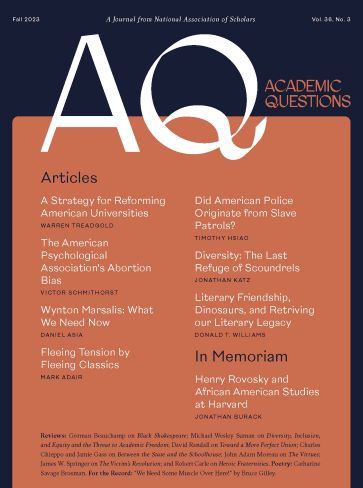In June 2022 the Supreme Court of the United States issued its official ruling in the highly publicized case of Dobbs v. Jackson Women’s Health Organization (2022). By a 6-3 majority, the court struck down the forty-nine-year-old precedent set by the Roe v. Wade (1973) ruling that had previously made it illegal for individual states to outlaw abortion. Justice Samuel Alito issued the majority opinion of the court, stating that the “Constitution makes no reference to abortion, and no such right is implicitly protected by any constitutional provision.”1 Pro-choice organizations, celebrities, and groups have since decried the Dobbs ruling and the state laws that went into effect soon afterwards, with most claiming that legal restrictions on abortion by individual states would ultimately harm the women there who seek abortions. The most common arguments for this have been that women are at an increased risk for economic hardship, health problems, substance abuse, depression, and other negative outcomes if they are unable to receive an abortion.2
Among the loudest voices who rallied against the Dobbs ruling was the American Psychological Association (APA). No stranger to involving itself in topical political affairs, the APA issued a statement against the decision on the grounds that denying abortion access can cause psychological harm to the pregnant women who seek it. The APA outlined anxiety, stress, depression, lower life satisfaction, and lower self-esteem as the potential mental health consequences of being denied an abortion.3 In a separate statement, the APA added that similarly negative mental health outcomes do not occur in women who receive abortions.4 “Abortion-specific posttraumatic stress,” or PTSD-like mental health consequences that arise from having an abortion, are likewise claimed to be rare.5 Instead, as the APA states, the most common emotional response to having an abortion is relief. The APA claims that scientific research “from around the world shows having an abortion is not linked to mental health issues but restricting access is.”4
It seems that the message behind these statements is crystal clear: women who can’t get abortions will suffer, while those that do get abortions can only benefit. Based on this assessment, it seems reasonable that an organization as committed to mental health as the APA would be critical of the Supreme Court’s decision. But are the APA’s claims actually supported by the evidence?
Not exactly. While the aforementioned research has outlined the potentially negative impacts of being denied an abortion, contrary to the APA’s claim, research regarding the negative psychological effects of receiving an abortion is alive and well. According to an extensive literature review conducted by David Reardon at the Elliot Institute in Illinois,6 a substantial portion of abortion research shows that the procedure is consistently associated with negative outcomes for at least some women. Reardon cites research conducted by the APA itself and case studies from both pro-choice and pro-life post-abortion counselors to support that suffering from maladjustment, among other mental health concerns, after receiving an abortion is far from uncommon. Indeed, the APA’s own research even shows that rates of depression and stress are susceptible to becoming worse as more time passes since the abortion was performed.7
Reardon continues by citing research that aims to identify the relevant risk factors for women who may suffer from the adverse effects of receiving an abortion, ending with the conclusion that “there is little if any research identifying which women, if any, acquire any mental health benefits from abortion compared to carrying a pregnancy to term, even if the pregnancy was unintended or unwanted.”6 Quite the opposite of what the APA has claimed.
Donald Paul Sullins, a researcher from The Catholic University of America, furthers Reardon’s claims with his own thirteen-year longitudinal study regarding the adverse mental health effects of receiving an abortion.8 When controlling for sociodemographic variables, among other confounding factors, Sullins found that abortion was consistently associated with an elevated risk of developing a mental disorder after the procedure was performed. Major depression, anxiety disorders, and substance use disorders were among the disorders that were found to have a higher prevalence after an abortion. Interestingly, abortion was found to be the only pregnancy outcome that was significantly correlated in this way; miscarriages and going through with an unwanted pregnancy, for instance, were not significantly correlated with developing a mental disorder later on.
These findings are congruent with those from an earlier, thirty-year longitudinal study conducted in New Zealand, which found that abortion was associated with a thirty percent increase in the rate of mental disorders among women who received them.9
These findings are in direct contradiction to what the APA has outlined in several of their statements, most notably the ones they released immediately following the Dobbs decision. So why does the APA not acknowledge them? Why does the APA insist on such an obvious display of confirmation bias?
The answer lies in the association’s political mission. While the APA purportedly aims to further psychology’s status as a science and relevant field of healthcare, today it is clear that one of the association’s primary functions is acting as a political apparatus for progressive causes. Indeed, the modern APA states they are “committed to infusing the principles of equity, diversity, and inclusion into all aspects of the work we do,”10 and that they aim to “increase [their] influence on policy decisions at the international, national, state, and local levels.”11 Based on these quotes and the APA’s clearly-stated views on abortion policy, it does not take much to imagine what kinds of political causes they support. Indeed, the APA has endorsed a stringent reinforcing of their political views through their recommendations on graduate, undergraduate, and secondary school curricula and teaching methods.12
Perhaps, were it not for nationwide efforts to resist such blatant politicization, the APA would falsely influence national discourse on topics such as abortion, both in and outside of academic spaces, more than it already does. Ultimately, it is up to current and future educators, along with coordinated efforts across the country, to speak out against the APA’s blatant politicization and confirmation bias on important and legitimately contested topics. By doing so, we can ensure that fair and honest discussions are had to the benefit of everyone, even on matters as bitterly debated as abortion.
Victor Schmithorst is currently pursuing a Doctor of Psychology (Psy.D) at Wright State University’s School of Professional Psychology.
1 Dan Mangan, Kevin Breuninger, “Supreme Court Overturns Roe v. Wade, Ending 50 Years of Federal Abortion Rights,” CNBC, June 24, 2022.
2 “The Harms of Denying a Woman a Wanted Abortion: Findings from the Turnaway Study,” Advancing New Standards in Reproductive Health, published April 16, 2020, https://www.cnbc.com/2022/06/24/roe-v-wade-overturned-by-supreme-court-ending-federal-abortion-rights.html.
3 American Psychological Association, “APA Decries SCOTUS Decision on Abortion,” June 27, 2022, https://www.apa.org/news/press/releases/2022/06/scotus-abortion-decision.
4 Zara Abrams, “The Facts about Abortion and Mental Health,” Monitor on Psychology 53, no. 6 (2022): 40.
5 “The Mental Health Impact of Receiving vs. Being Denied a Wanted Abortion,” Advancing New Standards in Reproductive Health, July 24, 2018, https://www.ansirh.org/sites/default/files/publications/files/mental_health_issue_brief_7-24-2018.pdf.
6 David A. Reardon, “The Abortion and Mental Health Controversy: A Comprehensive Literature Review of Common Ground Agreements, Disagreements, Actionable Recommendations, and Research Opportunities,” Sage Open Medicine 6 (October 2022): 205031211880762, https://doi.org/10.1177/2050312118807624.
7 Brenda Major et al., “Psychological Responses of Women After First-Trimester Abortion,” Archives of General Psychiatry 57, no. 8 (August 2000): 777-784, https://doi.org/10.1001/archpsyc.57.8.777.
8 Donald Paul Sullins, “Abortion, Substance Abuse and Mental Health in Early Adulthood: Thirteen-Year Longitudinal Evidence from the United States,” Sage Open Medicine 4 (September 2016), https://doi.org/10.1177/2050312116665997.
9 David M. Fergusson, L. John Horwood, Joseph M. Boden, “Abortion and Mental Health Disorders: Evidence from a 30-Year Longitudinal Study,” British Journal of Psychiatry 193, no. 6 (January 2018): 444-451, https://doi.org/10.1192/bjp.bp.108.056499.
10 “About APA,” American Psychological Association, last modified January 2022, https://www.apa.org/about.
11 “APA Strategic Plan,” American Psychological Association, last modified February 2019, https://www.apa.org/about/apa/strategic-plan.
12 Stephanie Pappas, “Changing the World from the Classroom: Action Teaching Aims to Educate Students about Psychology While Simultaneously Enabling Them to Contribute to Society,” Monitor on Psychology 50, no. 10 (November 2019): 20, https://www.apa.org/monitor/2019/11/classroom; Shawn Rhoads, Joscelin Rocha-Hidalgo, “Designing a Course and Syllabus in Psychological Science: Tips and Resources for Enhancing Your Classroom Experience,” American Psychological Association, November 30, 2020. https://www.apa.org/science/leadership/students/course-syllabus.














